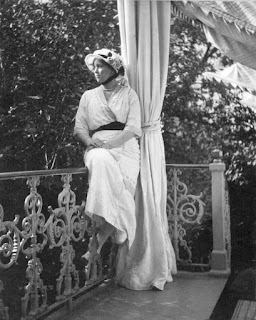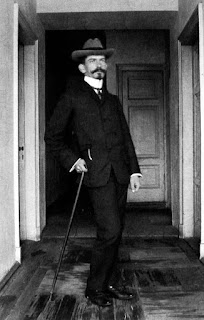Sources:
Memories of the Russian Court, pages 107 to 116, by Anna Vyrubova, 1923
The account (I have corrected the punctuation and divided into more paragraphs for easier reading):
... The Empress ... became overnight a changed being. Every bodily ill and weakness forgotten, she began at once an extensive plan for a system of hospitals and sanitary trains for the dreadful roll of wounded, which she knew must begin with the first battle. Her projected chain of hospitals and sanitary centers reached from Petrograd and Moscow to Charkoff and Odessa... The center of her personal activity was fixed in a large group of evacuation hospitals in and around Tsarskoe Selo, and there, after bidding farewell to my only brother, who immediately left for the southern front, I joined the Empress. Already her plans were so far matured that ten sanitary trains, bearing her name and the children's, were in active service, and something like eighty-five hospitals were open, or preparing to open, in Tsarskoe Selo, Peterhof, Pavlovsk, Louga, Sablino, and neighboring towns.
The Empress, her two older daughters, and myself immediately enrolled under a competent woman surgeon, Dr. Gedroiz, as student nurses, spending two hours of every afternoon under theoretical instruction, and the entire hours of the morning in ward work in the hospitals.
For the benefit of those who imagine that the work of a royal nurse is more or less in the nature of play, I will describe the average routine of one of those mornings in which I was privileged to assist the Empress Alexandra Feodorovna and the Grand Duchesses Olga and Tatiana, the two last-named girls of nineteen and seventeen. Please remember that we were then only nurses in training.
Arriving at the hospital shortly after nine in the morning, we went directly to the receiving wards where the men were brought in after having first-aid treatment in the trenches and field hospitals. They had traveled far and were usually disgustingly dirty as well as blood-stained and suffering. Our hands scrubbed in anti-septic solutions, we began the work of washing, cleaning, and bandaging maimed bodies, mangled faces, blinded eyes, all the indescribable mutilations of what is called civilized warfare. These we did under the orders and the direction of trained nurses who had the skill to do the things our lack of experience prevented us from doing.
As we became accustomed to the work, and as both the Empress and Tatiana had extraordinary ability as nurses, we were given more important work. I speak of the Empress and Tatiana especially because Olga within two months was almost too exhausted and too unnerved to continue, and my abilities proved to be more in the executive and organizing than in the nursing end of hospital work. I have seen the Empress of Russia in the operating room of a hospital holding ether cones, handling sterilized instruments, assisting in the most difficult operations, taking from the hands of the busy surgeons amputated legs and arms, removing bloody and even vermin-infected dressings, enduring all the sights and smells and agonies of that most dreadful of all places, a military hospital in the midst of war. She did her work with the humility and the gentle tirelessness of one dedicated by God to a life of ministration. Tatiana was almost as skillful and quite as devoted as her mother, and complained only that on account of her youth she was spared some of the more trying cases.
The Empress was spared nothing, nor did she wish to be. I think I never saw her happier than on the day, at the end of our two months' intensive training, she marched at the head of the procession of nurses to receive the red cross and the diploma of a certificated war nurse.
From that time on, our days were literally devoted to toil. We rose at seven in the morning and very often it was an hour or two after midnight before we sought our beds. The Empress, after a morning in the operating room of one hospital, snatched a hasty luncheon and spent the rest of the day in a round of inspection of other hospitals. Every morning early, I met her in the little Church of Our Lady of Znamenie, where we went for prayers, driving afterwards to the hospitals. On the days when the sanitary trains arrived with their ghastly loads of wounded we often worked from nine until three without stopping for food or rest.
The Empress literally shirked nothing. Sometimes when an unfortunate soldier was told by the surgeons that he must suffer an amputation or undergo an operation which might be fatal, he turned in his bed calling out her name in anguished appeal. "Tsaritsa! Stand near me. Hold my hand, that I may have courage." Were the man an officer or a simple peasant boy, she always answered the appeal. With her arm under his head, she would speak words of comfort and encouragement, praying with him while preparations for the operation were in progress, her own hands assisting in the merciful work of anesthesia. The men idolized her, watched for her coming, reached out bandaged hands to touch her as she passed, smiling happily as she bent over their pillows. Even the dying smiled as she knelt beside their beds, murmuring last words of prayer and consolation.
In the last days of November, 1914, the Empress left Tsarskoe Selo for an informal inspection of hospitals within the radius of her especially chosen district. Dressed in the gray uniform of a nursing sister, accompanied by her older daughters, myself, and a small suite, she went to towns surrounding Tsarskoe Selo and southward as far as Pskoff, staff headquarters, where the younger Grand Duchess Marie Pavlovna was a hospital nurse. From there she proceeded to Vilna, Kovno and Grodno, in which city she met the Emperor and with him went on to Dvinsk.
The enthusiasm and affection with which the Empress was met in all these places and in stations along the route beggars description. A hundred incidents of the journey crowd my memory, each one worth the telling had I space to include them in this narrative. I remember, for example, the remarkable scene in the big fortress of Kovno, where acres of hospital beds were assembled and where the tall figure of the Empress, moving through those interminable aisles, was greeted like the visit of an angel. I never recall that journey without remembering the hospital at Grodno, where a gallant young officer lay dying of his wounds. Hearing that the Empress was on her way to the hospital, he rallied unexpectedly and declared to his nurses that he was determined to live until she came. Sheer will power kept life in the man's body until the Empress arrived, and when, at the door of the hospital, she was told of his dying wish to see her, she hurried first to his bedside, kneeling beside it and receiving his last smile, his last gasping words of greeting and farewell.
After one very fatiguing day our train passed a sanitary train of the Union of Zemstvos moving south. The Empress, who should have been resting in bed at the time, ordered her train stopped that she might visit, to the surprise and delight of the doctors, this splendidly equipped rolling hospital. Another surprise visit was to the estate of Prince Tichkevitch, whose family supported on their own lands a very efficient hospital unit. It was impossible to avoid noticing how in the towns visited by the Empress, dressed as a simple sister of mercy, the love of the people was most manifest. In Grodno, Dvinsk, and other cities where she appeared with the Emperor, there was plenty of enthusiasm, but on those occasions etiquette obliged her to lay aside her uniform and to dress as the wife of the Emperor. Much better the people loved her when she went among them in her nurse's dress, their devoted friend and sister. Etiquette forgotten, they crowded around her, talked to her freely, claimed her as their own. ...

Above: Alexandra with Dr. Vera Gedroitz.
Above: Alexandra with Anna Vyrubova, Olga and Tatiana.
Above: Alexandra and Anna Vyrubova with some of their patients.




























